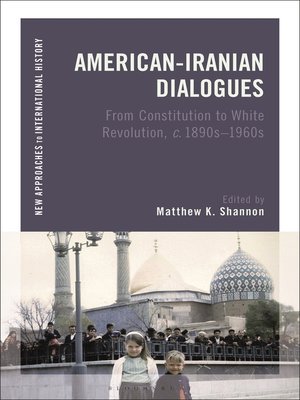American-Iranian Dialogues
ebook ∣ From Constitution to White Revolution, c. 1890s-1960s · New Approaches to International History
By Matthew K. Shannon

Sign up to save your library
With an OverDrive account, you can save your favorite libraries for at-a-glance information about availability. Find out more about OverDrive accounts.
Find this title in Libby, the library reading app by OverDrive.



Search for a digital library with this title
Title found at these libraries:
| Library Name | Distance |
|---|---|
| Loading... |
Bringing together historians of US foreign relations and scholars of Iranian studies, American-Iranian Dialogues examines the cultural connections between Americans and Iranians from the constitutional period of the 1890s through to the start of the White Revolution in the 1960s.
Taking an innovative cultural approach, chapters are centred around major themes in American-Iranian encounters and cultural exchange throughout this period, including stories of origin, cultural representations, nationalism and discourses on development. Expert contributors draw together different strands of US-Iranian relations to discuss a range of path-breaking topics such as the history of education, heritage exchange, oil development and the often-overlooked interactions between American and Iranian non-state actors.
Through exploring the understudied cultural dimensions of US-Iranian relations, this book will be essential reading for students and scholars interested in American history, international history, Iranian studies and Middle Eastern studies.
Taking an innovative cultural approach, chapters are centred around major themes in American-Iranian encounters and cultural exchange throughout this period, including stories of origin, cultural representations, nationalism and discourses on development. Expert contributors draw together different strands of US-Iranian relations to discuss a range of path-breaking topics such as the history of education, heritage exchange, oil development and the often-overlooked interactions between American and Iranian non-state actors.
Through exploring the understudied cultural dimensions of US-Iranian relations, this book will be essential reading for students and scholars interested in American history, international history, Iranian studies and Middle Eastern studies.







